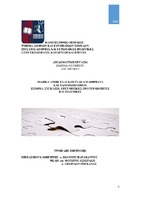Μαζικά ανοικτά διαδικτυακά μαθήματα και παιχνιδοποίηση: ιστορία, σύγκλιση, ερευνητικές προτεραιότητες και πολιτικές

Προβολή/
Λέξεις κλειδιά
Παιχνιδοποίηση ; Διαδικτυακή πλατφόρμα ; Ανοικτότητα εκπαίδευσης ; Διαδικτυακά μαθήματα ; Gamification ; Open online cources ; Μαζική εκπαίδευσηΠερίληψη
Τα Μαζικά Ανοικτά Διαδικτυακά Μαθήματα/Μ.Α.Δ.Μ., μια μορφή εξ’ αποστάσεως ηλεκτρονικής μάθησης, που χαρακτηρίστηκε ως αποδιοργανωτική καινοτομία στο χώρο της εκπαίδευσης, γνώρισαν κατά την τρέχουσα δεκαετία πρωτόγνωρη διάδοση παγκοσμίως.
Με τεχνικούς παρόχους πολυάριθμες ψηφιακές πλατφόρμες διαχείρισης μαθημάτων και παρόχους περιεχομένου φημισμένα Πανεπιστήμια, εταιρείες διαδικτυακών υπηρεσιών όπως η Google, ή και φορείς όπως η Ευρωπαϊκή Ψηφιακή Βιβλιοθήκη Europeana, τα Μ.Α.Δ.Μ. είχαν από την πρώτη στιγμή μεγάλη προβολή στα μέσα μαζικής ενημέρωσης και βρέθηκαν πολύ γρήγορα αντιμέτωπα με τα πυρά της κριτικής, με κύριο στόχο τα μεγάλα ποσοστά σπουδαστών που εγκαταλείπουν πρόωρα τα προγράμματα στα οποία έχουν εγγραφεί.
Η επιστράτευση της παιχνιδοποίησης ως τρόπου αντιστάθμισης παραγόντων που θεωρήθηκε ότι συνέβαλαν στην μειωμένη εμπλοκή των σπουδαστών, φάνηκε να έχει θετικά αποτελέσματα και οδήγησε τους σχεδιαστές ολοένα και περισσότερων Μ.Α.Δ.Μ. στην επιλογή της ενσωμάτωσης διαφόρων στοιχείων παιχνιδοποίησης στη δομή των μαθημάτων, αποσκοπώντας στη δημιουργία ενός ευχάριστου και φιλικού προς το χρήστη ψηφιακού μαθησιακού περιβάλλοντος που θα παρείχε τις προϋποθέσεις για επαυξημένη εμπλοκή των σπουδαστών, δίνοντάς τους κίνητρα για να παρατείνουν την ενασχόλησή τους με το περιεχόμενο και τις δραστηριότητες των προγραμμάτων.
Στο πλαίσιο της παρούσας διπλωματικής εργασίας επιχειρήθηκε κατ’ αρχήν ιστορική αναδρομή στις απαρχές τόσο των Μ.Α.Δ.Μ., όσο και της Παιχνιδοποίησης, εξετάζοντας την προέλευσή τους, τις τεχνολογικές και εκπαιδευτικές προϋποθέσεις της ανάδυσής τους, την παράλληλη εξέλιξη και τη σύγκλισή τους, τις κρατικές, ευρωπαϊκές και Ιδρυματικές πολιτικές που τα επηρέασαν και σε ότι αφορά στα Μ.Α.Δ.Μ. τη σχέση τους με το κίνημα της Ανοικτής Εκπαίδευσης που εμπλέκεται με τον προσδιορισμό μέρους της ταυτότητάς τους, την ανοικτότητα.
Στη συνέχεια, αφού ερευνήθηκε ο τρόπος με τον οποίο διασαφηνίστηκαν όροι όπως στοιχεία παιχνιδοποίησης, μηχανισμοί και δυναμικές παιχνιδοποίησης κ.α., επιχειρήθηκε διερεύνηση σχετικά με τη χρήση συγκεκριμένων στοιχείων παιχνιδοποίησης σε Μ.Α.Δ.Μ., με πληροφορίες που αντλήθηκαν από δεκαπέντε εμπειρικές μελέτες της αγγλόφωνης κατά κύριο λόγο βιβλιογραφίας των ετών 2014-2019 και ακολούθησε αντίστοιχη έρευνα και μερική αποτύπωση της εμπειρίας συμμετοχής της συντάκτριας σε δώδεκα Μ.Α.Δ.Μ. που ήταν ενεργά κατά το χρονικό διάστημα Νοεμβρίου-Δεκεμβρίου 2019, αλλά και σχετική έρευνα στο πληροφοριακό υλικό τριών πλατφορμών για Μ.Α.Δ.Μ. Σε αυτό το στάδιο ερευνήθηκε και κατά πόσον το περιεχόμενο των μαθημάτων διετίθετο ως Ανοικτός Εκπαιδευτικός Πόρος.
Η σύγκριση των ευρημάτων οδήγησε, μεταξύ άλλων στο συμπέρασμα ότι η παιχνιδοποίηση, κοινωνική και δομική έχει πλέον σε μεγάλο βαθμό διεισδύσει στο σχεδιασμό των Μ.Α.Δ.Μ και εντοπίστηκαν τα στοιχεία παιχνιδοποίησης με τη συχνότερη χρήση.


